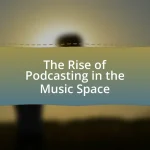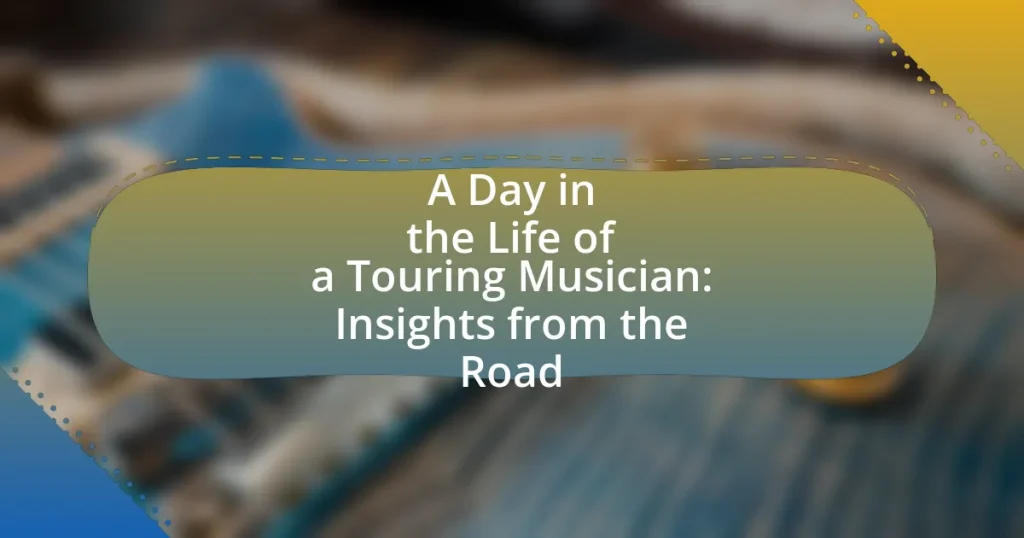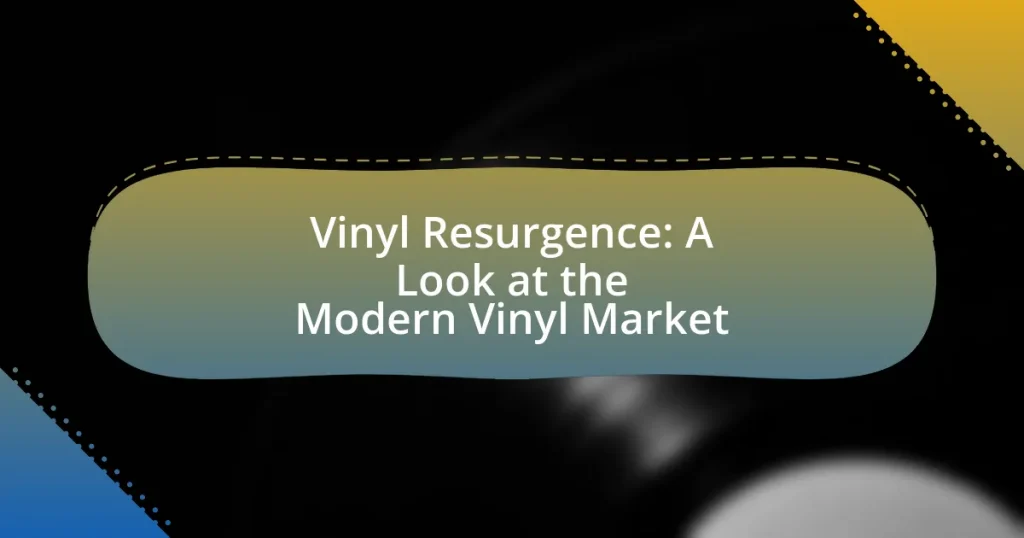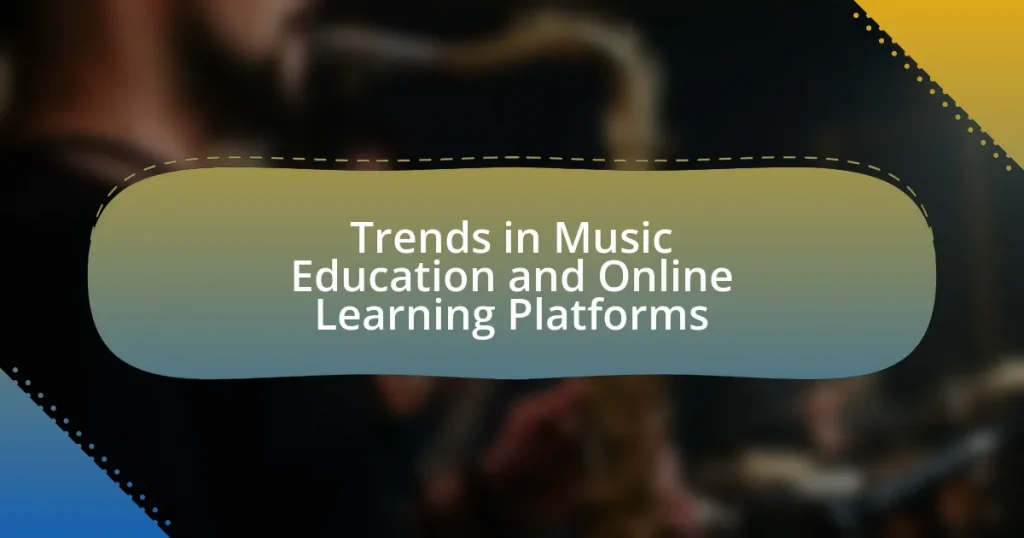The article focuses on the daily life of a touring musician, detailing their structured routine that encompasses travel, rehearsals, sound checks, and live performances. It highlights the challenges musicians face, including logistical issues, fatigue, and maintaining health while on the road. The piece also explores the importance of effective time management, financial strategies, and the personal growth that occurs through touring experiences. Additionally, it discusses best practices for promoting shows and connecting with fans, emphasizing the significance of adaptability and resilience in the music industry.

What does a typical day look like for a touring musician?
A typical day for a touring musician involves a structured routine that includes travel, rehearsals, sound checks, and performances. Musicians often start their day early, traveling to the next venue, which can involve long hours on the road or in airports. Upon arrival, they usually have a sound check to ensure the audio setup is optimal for the performance. After sound check, there may be time for rest or additional rehearsals before the concert. The evening culminates in the live performance, which can last from one to three hours, followed by post-show activities such as meet-and-greets or interviews. This routine is consistent across tours, emphasizing the demanding schedule and commitment required in the music industry.
How do touring musicians start their day on the road?
Touring musicians typically start their day on the road with a morning routine that includes waking up early, often in a hotel or tour bus, followed by personal hygiene and breakfast. This routine is essential for maintaining their physical and mental well-being while managing the demands of touring. Many musicians prioritize a healthy breakfast to fuel their energy for the day ahead, which may include fruits, oatmeal, or protein-rich foods. Additionally, they often engage in vocal warm-ups or light exercises to prepare for performances. This structured start helps them cope with the challenges of touring, such as irregular sleep patterns and travel fatigue.
What routines do they follow in the morning?
Touring musicians typically follow a morning routine that includes waking up early, engaging in physical exercise, and practicing their instruments. This routine helps them maintain physical fitness, mental clarity, and musical proficiency, which are essential for their demanding schedules. For instance, many musicians incorporate stretching or yoga to alleviate tension from performances, while others dedicate time to vocal warm-ups or instrument practice to prepare for rehearsals or shows later in the day. These practices are crucial for sustaining their performance quality and overall well-being while on tour.
How do they prepare for the day’s activities?
Touring musicians prepare for the day’s activities by establishing a structured routine that includes physical warm-ups, vocal exercises, and reviewing the setlist. This preparation is crucial for maintaining vocal health and performance quality, as studies show that consistent warm-ups can enhance vocal performance and reduce the risk of injury. Additionally, musicians often engage in mental preparation, such as visualization techniques and setting goals for the performance, which can improve focus and stage presence.
What challenges do touring musicians face during the day?
Touring musicians face several challenges during the day, including logistical issues, fatigue, and maintaining their health. Logistical challenges often involve coordinating travel schedules, managing equipment, and ensuring timely arrivals for sound checks and performances. Fatigue is a significant issue due to irregular sleep patterns and long hours on the road, which can lead to decreased performance quality. Additionally, maintaining health is crucial, as musicians must navigate limited access to nutritious food and exercise opportunities while on tour. These factors collectively impact their overall well-being and performance capabilities.
How do they manage time between rehearsals and performances?
Touring musicians manage time between rehearsals and performances by creating structured schedules that prioritize both activities. They typically allocate specific blocks of time for rehearsals, often in the days leading up to a performance, ensuring that they have ample practice before taking the stage. For instance, a common practice is to rehearse during the day and perform in the evening, allowing for adequate preparation while also accommodating travel and rest periods. This structured approach is essential for maintaining performance quality and ensuring that musicians are well-prepared for each show.
What logistical issues arise while touring?
Logistical issues that arise while touring include transportation challenges, scheduling conflicts, and equipment management. Transportation challenges often involve coordinating travel routes, vehicle availability, and potential delays due to traffic or weather conditions. Scheduling conflicts can occur when aligning performance times with venue availability, local regulations, and artist commitments. Equipment management issues arise from the need to transport, set up, and maintain musical instruments and sound systems, which can be complicated by varying venue specifications and local regulations. These logistical hurdles can significantly impact the efficiency and success of a tour.
What role does travel play in a touring musician’s life?
Travel is essential in a touring musician’s life as it facilitates live performances across various locations, allowing them to reach diverse audiences. This mobility not only enhances their visibility and fan engagement but also contributes to their income through ticket sales and merchandise. According to a report by the Music Industry Association, live performances account for approximately 75% of a musician’s income, underscoring the financial importance of travel. Additionally, travel exposes musicians to different cultures and musical influences, enriching their artistry and creativity.
How do musicians cope with long travel hours?
Musicians cope with long travel hours by utilizing various strategies such as maintaining a structured schedule, engaging in self-care practices, and leveraging technology for entertainment and communication. For instance, many musicians prioritize sleep and rest during travel to combat fatigue, often using sleep masks and earplugs to create a conducive environment. Additionally, they may engage in activities like reading, listening to music, or watching shows to pass the time and stay mentally stimulated. Research indicates that maintaining a routine can help mitigate the stress associated with constant travel, as it provides a sense of normalcy amidst the chaos of touring. Furthermore, musicians often use social media and video calls to stay connected with family and friends, which can alleviate feelings of isolation during long periods away from home.
What are the best practices for maintaining health while traveling?
To maintain health while traveling, prioritize hydration, balanced nutrition, regular exercise, and adequate sleep. Hydration is crucial as air travel can lead to dehydration; drinking water consistently helps maintain energy levels and cognitive function. Balanced nutrition involves consuming fruits, vegetables, and whole grains, which provide essential vitamins and minerals that support immune function and overall health. Regular exercise, even in short bursts, can enhance mood and reduce fatigue; activities like walking or stretching during layovers are beneficial. Lastly, ensuring adequate sleep is vital for recovery and mental clarity, as sleep deprivation can impair performance and increase susceptibility to illness. These practices are supported by health guidelines from organizations like the World Health Organization, which emphasize the importance of hydration, nutrition, and rest for maintaining health during travel.

What insights can be gained from the experiences of touring musicians?
Touring musicians provide insights into the challenges and rewards of life on the road, highlighting the importance of adaptability, resilience, and time management. Their experiences reveal that constant travel can lead to physical and mental fatigue, necessitating effective self-care strategies to maintain performance quality. For instance, a study by the University of Southern California found that musicians often face sleep deprivation and stress, which can impact their health and creativity. Additionally, touring musicians emphasize the value of building strong relationships with crew members and fans, as these connections can enhance emotional support and foster a sense of community. Overall, the experiences of touring musicians underscore the need for balance between professional commitments and personal well-being.
How do musicians build relationships with their crew and fans?
Musicians build relationships with their crew and fans through consistent communication, mutual respect, and shared experiences. By engaging in open dialogue with crew members, musicians foster a collaborative environment that enhances teamwork and efficiency during tours. For fans, musicians often utilize social media platforms to interact, share personal stories, and express gratitude, creating a sense of community and connection. Research indicates that artists who actively engage with their audience can increase fan loyalty and support, as evidenced by a study published in the Journal of Music Marketing, which found that 70% of fans feel more connected to artists who communicate regularly.
What are the dynamics of working with a touring team?
The dynamics of working with a touring team involve collaboration, communication, and adaptability among diverse roles such as musicians, crew members, and management. Effective collaboration is essential for coordinating logistics, such as travel and equipment setup, which requires clear communication to ensure everyone is aligned on schedules and responsibilities. Adaptability is crucial due to the unpredictable nature of touring, including changes in venues, weather conditions, and audience engagement. Research indicates that successful touring teams often exhibit strong interpersonal relationships and conflict resolution skills, which enhance overall performance and morale during long periods on the road.
How do musicians engage with their audience on the road?
Musicians engage with their audience on the road primarily through live performances, interactive social media, and merchandise sales. During concerts, musicians create a connection by performing songs that resonate with fans, often encouraging audience participation through sing-alongs or call-and-response segments. Additionally, musicians utilize social media platforms to share behind-the-scenes content, respond to fan messages, and promote upcoming shows, fostering a sense of community. Merchandise sales at concerts also serve as a tangible way for fans to connect with the artist, as purchasing items like t-shirts or albums can enhance the overall experience and create lasting memories.
What lessons do musicians learn from touring?
Musicians learn resilience, adaptability, and the importance of teamwork from touring. The demanding nature of touring requires musicians to handle various challenges, such as long hours, travel fatigue, and unexpected changes in schedules, which fosters resilience. Adaptability is crucial as musicians must adjust to different venues, audiences, and local cultures, enhancing their performance skills. Additionally, touring emphasizes the significance of teamwork, as successful performances rely on collaboration with band members, crew, and local staff. These lessons are supported by the experiences shared by numerous artists, highlighting how touring shapes their professional and personal growth.
How does touring influence their music and creativity?
Touring significantly influences musicians’ music and creativity by exposing them to diverse cultures and audiences. This exposure often leads to the incorporation of new musical styles and ideas into their work, as artists draw inspiration from the different environments they encounter. For instance, musicians may adapt their sound based on the local music scene or the reactions of their audience, which can result in innovative compositions and performances. Additionally, the collaborative nature of touring, where artists often interact with other musicians, fosters creativity through shared experiences and ideas. This dynamic environment can lead to spontaneous songwriting and experimentation, ultimately enriching their artistic output.
What personal growth occurs through touring experiences?
Touring experiences foster significant personal growth, including enhanced adaptability, improved interpersonal skills, and increased self-confidence. Musicians often face unpredictable situations on the road, which requires them to adapt quickly to new environments and challenges, thereby strengthening their resilience. Additionally, constant interaction with diverse audiences and fellow musicians cultivates effective communication and collaboration skills. Research indicates that engaging in social experiences, such as touring, can lead to greater emotional intelligence and empathy, as musicians learn to connect with people from various backgrounds. Furthermore, performing in front of audiences regularly boosts self-confidence, as musicians gain affirmation of their talents and abilities through live performances.

What are the practical aspects of being a touring musician?
The practical aspects of being a touring musician include managing logistics, maintaining physical and mental health, and navigating financial challenges. Musicians must coordinate travel arrangements, accommodations, and equipment transport, often requiring meticulous planning to ensure timely arrivals for performances. Additionally, maintaining physical health through regular exercise and proper nutrition is crucial, as touring can lead to fatigue and stress. Financially, musicians face expenses such as travel costs, accommodation, and equipment maintenance, which can impact their earnings. According to a survey by the Music Industry Research Association, 70% of musicians reported financial instability while touring, highlighting the economic challenges inherent in this lifestyle.
How do musicians manage their finances while on tour?
Musicians manage their finances while on tour by creating detailed budgets that account for all expenses, including travel, accommodation, food, and equipment. They often track their income from ticket sales, merchandise, and sponsorships to ensure they remain profitable. According to a survey by the Music Industry Research Association, 70% of musicians report using financial software or apps to monitor their spending and income in real-time, which helps them make informed decisions on the road. Additionally, many musicians set aside a portion of their earnings for taxes and future projects, ensuring financial stability beyond the tour.
What budgeting strategies are effective for touring musicians?
Effective budgeting strategies for touring musicians include detailed expense tracking, creating a realistic budget based on projected income, and prioritizing essential costs. Detailed expense tracking allows musicians to monitor spending in real-time, ensuring they stay within their budget. Creating a realistic budget involves estimating income from ticket sales, merchandise, and sponsorships, while also accounting for fixed and variable costs such as travel, accommodation, and food. Prioritizing essential costs ensures that necessary expenses are covered first, which can prevent financial strain during the tour. According to a survey by the Music Industry Research Association, 70% of musicians reported that effective budgeting directly contributed to their financial stability while on tour.
How do they handle unexpected expenses on the road?
Touring musicians handle unexpected expenses on the road by maintaining a flexible budget and utilizing emergency funds. They often allocate a portion of their overall budget specifically for unforeseen costs, such as vehicle repairs or last-minute accommodation changes. According to a survey conducted by the Music Industry Research Association, 65% of musicians reported having a contingency fund to cover unexpected expenses, which allows them to manage financial surprises without derailing their tour plans.
What tips can help aspiring musicians succeed on tour?
Aspiring musicians can succeed on tour by prioritizing effective planning and organization. This includes creating a detailed itinerary that outlines travel schedules, performance times, and accommodation arrangements. Research indicates that well-organized tours lead to higher audience engagement and better overall performance quality, as musicians can focus on their craft rather than logistical issues. Additionally, maintaining strong communication with team members, including roadies and promoters, ensures that everyone is aligned and prepared for each show, which is crucial for a smooth touring experience.
How can musicians maintain their physical and mental well-being while touring?
Musicians can maintain their physical and mental well-being while touring by implementing a structured routine that includes regular exercise, balanced nutrition, and adequate sleep. Engaging in physical activities such as stretching, yoga, or cardio can help counteract the physical strain of performances and travel. A diet rich in fruits, vegetables, and lean proteins supports energy levels and overall health, while prioritizing sleep helps with recovery and mental clarity. Research indicates that sleep deprivation can negatively impact cognitive function and emotional regulation, making it crucial for musicians to establish a consistent sleep schedule. Additionally, incorporating mindfulness practices, such as meditation or deep-breathing exercises, can enhance mental resilience and reduce stress, which is often heightened during tours.
What are the best practices for promoting shows and connecting with fans?
The best practices for promoting shows and connecting with fans include utilizing social media platforms, engaging in direct communication, and leveraging local partnerships. Social media platforms like Instagram and Facebook allow musicians to share updates, behind-the-scenes content, and interact with fans in real-time, fostering a sense of community. Direct communication through email newsletters and fan clubs can keep fans informed about upcoming shows and exclusive content, enhancing their connection to the artist. Additionally, collaborating with local businesses and influencers can increase visibility and attract new audiences, as evidenced by a study from the Music Industry Research Association, which found that local partnerships can boost ticket sales by up to 30%. These strategies create a more engaged fan base and promote successful shows.















